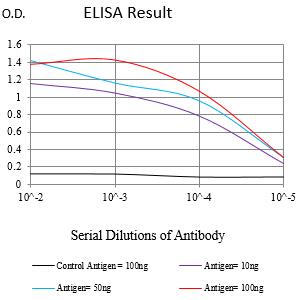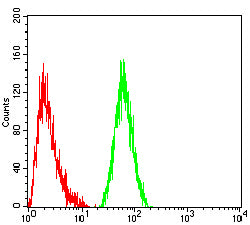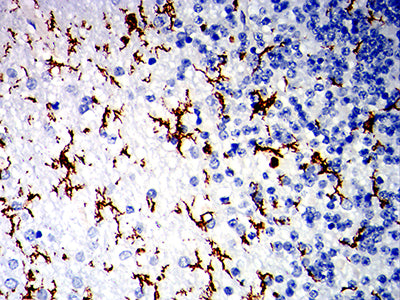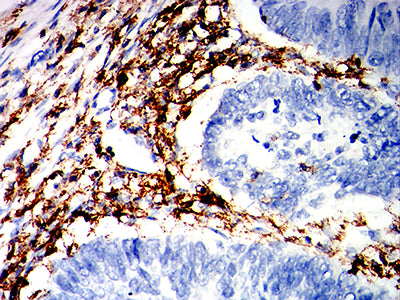



| WB | 咨询技术 | Human,Mouse,Rat |
| IF | 咨询技术 | Human,Mouse,Rat |
| IHC | 1/200 - 1/1000 | Human,Mouse,Rat |
| ICC | 技术咨询 | Human,Mouse,Rat |
| FCM | 1/200 - 1/400 | Human,Mouse,Rat |
| Elisa | 1/10000 | Human,Mouse,Rat |
| Aliases | CLA; SELPLG; PSGL1; PSGL-1 |
| Entrez GeneID | 6404 |
| clone | 3D5E11 |
| WB Predicted band size | 43.2kDa |
| Host/Isotype | Mouse IgG1 |
| Antibody Type | Primary antibody |
| Storage | Store at 4°C short term. Aliquot and store at -20°C long term. Avoid freeze/thaw cycles. |
| Species Reactivity | Human |
| Immunogen | Purified recombinant fragment of human CD162 (AA: 42-320) expressed in E. Coli. |
| Formulation | Purified antibody in PBS with 0.05% sodium azide |
+ +
以下是3篇关于CD162(PSGL-1)抗体的研究文献摘要概述:
1. **"Targeting PSGL-1 with a novel antibody to inhibit leukocyte trafficking in inflammation"**
*作者:Smith A, et al.*
摘要:研究开发了一种新型抗CD162单克隆抗体,通过阻断PSGL-1与选择素的相互作用,显著抑制中性粒细胞向炎症部位的迁移,为治疗慢性炎症疾病提供潜在策略。
2. **"Antibody-mediated PSGL-1 blockade enhances T cell activation in solid tumors"**
*作者:Lee C, et al.*
摘要:该文献发现抗CD162抗体可阻断肿瘤微环境中PSGL-1介导的T细胞抑制信号,增强抗肿瘤免疫应答,为癌症免疫治疗的联合用药提供实验依据。
3. **"PSGL-1 antibody reduces thrombotic complications in a murine sepsis model"**
*作者:Wang Y, et al.*
摘要:研究证明抗CD162抗体通过抑制血小板-白细胞聚集,降低脓毒症模型小鼠的血管内血栓形成,提示其在脓毒症相关凝血障碍中的治疗潜力。
×